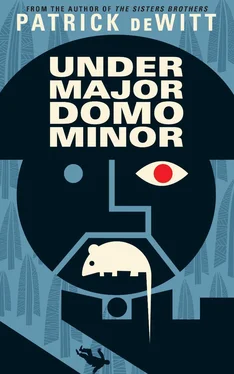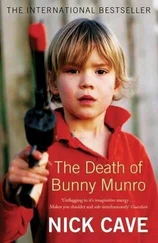“That’s fine, sir, thank you.”
“Yes, boy. And now, if you’ll follow me, please.” They entered a cavernous ballroom. Ringing the high walls were any number of ornately framed oil paintings, portraits of similarly regal-looking individuals, the Barons and Baronesses of yore, Lucy supposed, and correctly. Mr Olderglough stepped to the centre-point of the space and swivelled to face Lucy; when he spoke, his voice was staggered by an echo on the air. “Yet another room,” he said, “and a very large and empty room it is, wouldn’t you say?”
“It is large and empty, sir.”
“This dingy chamber once was filled with music and dancing and laughter and gaiety. And look at it now. Quiet as the grave.”
Indeed, the ballroom gave Lucy an uneasy feeling, as though it had been host to some godless occurrence or other. “And where have all the people gone to, sir?”
“After the Baroness left us, then we fell into our Decline.”
“Do you mean to say she died?”
“I don’t mean that, no. Only that she departed, and hasn’t returned, and likely will not return. But her leaving was like a death, if you’ll allow me my small melodrama.”
“Please.”
“Thank you.”
“You’re welcome.”
“Yes. Well, we’re coming on a full year now that she’s been away, and not a day goes past without my lamenting her absence.”
“You were very close to her, sir?”
“As close as one in my position can be. She extended me every kindness — kindnesses many of her stature would have forgone.” Mr Olderglough moved to stand before a painting of a swan-like beauty in a light-blue silk and lace gown: the Baroness Von Aux.
“A light in a dark place,” Mr Olderglough said.
“She looks to be afraid of something.”
“Yes. Oh, but she was very brave, as well.”
Lucy asked, “And where is the Baron currently, sir?”
“The Baron goes where the Baron wishes. And often as not he wishes to go nowhere at all.”
“I should like to thank him for the appointment, if I might.”
“The Baron has no knowledge of your appointment. In fact he hasn’t the remotest interest in the mechanics of the castle. Six days out of seven he won’t even leave his room. Seven days out of seven.”
“And what does he do in there, sir?”
“I suspect it involves a degree of brooding. But this is not your problem to ponder; it’ll be months before you lay eyes on the man, if you lay eyes on him.”
“I will wait to thank him then,” said Lucy.
Mr Olderglough shook his head, with emphasis. “You don’t understand what I’m telling you, boy. Don’t speak to the Baron if you see him. As a matter of fact, don’t see him at all, if you can avoid it. That is to say, don’t let him see you.”
Lucy asked, “Am I not meant to be here, sir?”
“No one is meant to be here.” Mr Olderglough was gripped by a shiver. Once it passed he turned to Lucy and asked, “Are you ever seized up like that, boy?”
“We all catch a chill, sir. I should think a fire would allay it.”
“No, it’s quite something else, I fear.” He pointed to the exit. “Moving on, then,” he said, quitting the ballroom in what could be described as a hurry.
They resumed their trek down the hallway, their heels clicking in time, then not.
“What of your trip, Lucy?”
“What of it, sir?”
“Will you tell me about it?”
“There isn’t much to tell, I’m afraid. I met a pair of villagers on the train.”
“Oh? And what did you make of them?”
“I found them somewhat strange, sir. I believe one of them stole my pipe.”
“You’ve met Memel, it sounds like.” There was an amusement in Mr Olderglough’s tone, but also something like derision. Lucy asked,
“Don’t you approve of him?”
“My approval or disapproval is irrelevant. The villagers are like children, and children can be dangerous entities in that they have no God. Do you understand what I mean when I say this?”
“Not quite, sir.”
“If there are no consequences for a person’s actions, what might his motivation be to do right by his fellow man?”
Lucy wasn’t sure if he was expected to answer the question or not. At any rate, he didn’t know what the answer might be, and Mr Olderglough didn’t press for a response. A quiet moment passed, much in the way a cloud passes, and Lucy found himself wanting to defend Memel, which was odd, considering he didn’t know the man, and that he had been victimized by him. Pondering this curiosity, he pushed on after Mr Olderglough, the pair of them descending a flight of stairs, and then another, where the air became thicker, almost swamp-like. It was scarcely credible to Lucy that this gloomy locale was now his home; presently he fell to wondering what his time would be like there, and so he enquired after his duties.
“Easier asked than answered,” said Mr Olderglough. “For our days here are varied, and so our needs are also varied. On the whole, I think you’ll find the workload to be light in that you will surely have ample free time. But then there comes the question of what one does with his free time. I have occasionally felt that this was the most difficult part of the job; indeed, the most difficult part of being alive, wouldn’t you say, boy?”
“Perhaps you’re right, sir.”
“Surely I am. Oftentimes I’m confronted with an afternoon or evening off, with not a stitch of work to do, and do you know, I meet this fact with something akin to panic.” Mr Olderglough sighed. “At any event: in the simplest terms, your foremost function is to anticipate my needs and see to them. Your predecessor was most gifted in this.”
“Mr Broom?”
A cold look crept across Mr Olderglough’s face. “How did you know his name?”
“Memel told me.”
“And what else did he tell you, I’d like to know?”
“Nothing else.”
“Nothing at all?”
“Not so very much. Will you tell me what happened with Mr Broom, sir?”
“Later, perhaps.”
“May I ask where he is now?”
“Later, boy.”
Lucy heard another volley of rifle fire occurring up the mountain. As casually as he might, he asked, “And who are these men with bayonets, sir?”
Mr Olderglough peered curiously towards the ceiling, as though clarification would meet him there. “Men with bayonets,” he said.
“They ran into the forest? To shoot at or be shot at by a second party?”
“Oh, them.” Mr Olderglough flapped his wounded wing dismissively. “Harmless. Nothing but a lot of noise. Ignore them, that’s what I do.”
Lucy found this unsatisfactory, naturally. “May I ask who it is they’re fighting?”
“Other men.” Mr Olderglough shrugged. “Men, like them.”
“And what are they fighting about, do you know?”
“Well, now, what does anyone fight about, boy?”
Lucy was baffled. And while he sensed his questions and comments were annoying Mr Olderglough, he couldn’t help but add, “I do wish I’d known about this beforehand.”
“Oh? And why is that?”
“Sir, there is a war taking place outside the castle.”
Mr Olderglough rolled his eyes. “It’s not a war ,” he said.
“Bullets are flying through the air.”
“That doesn’t make it a war . A war is a much bigger production. This is a trifle by comparison.” He thought awhile. “I hope you don’t think anyone will shoot at you.”
“I pray they don’t.”
“Of course they won’t. Why would they? A nice young fellow such as yourself.” Mr Olderglough reached over and pinched Lucy’s cheek, hard. The man’s fingers felt as though they were made of wood. What a long hallway this is , Lucy thought.
Читать дальше












